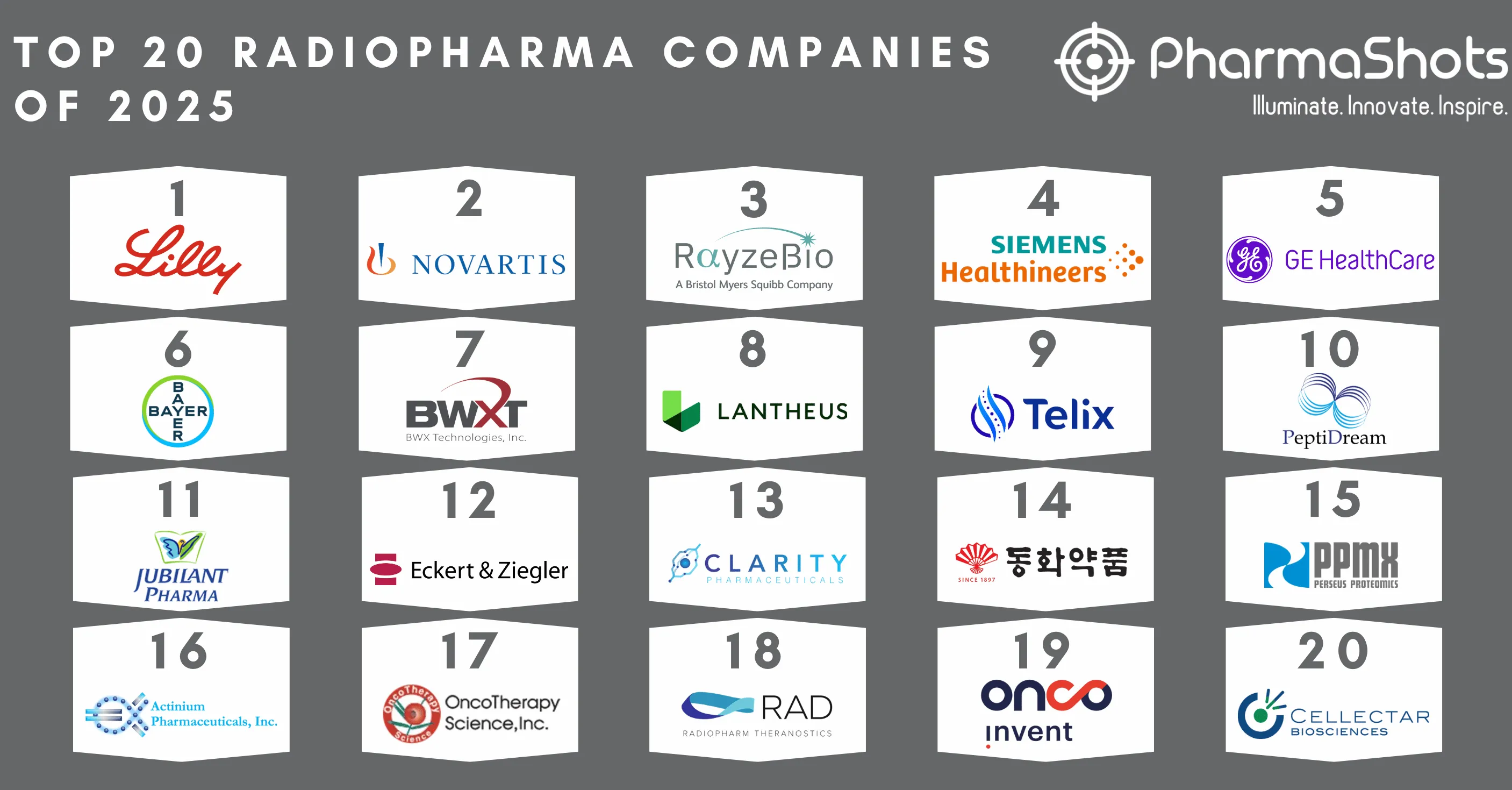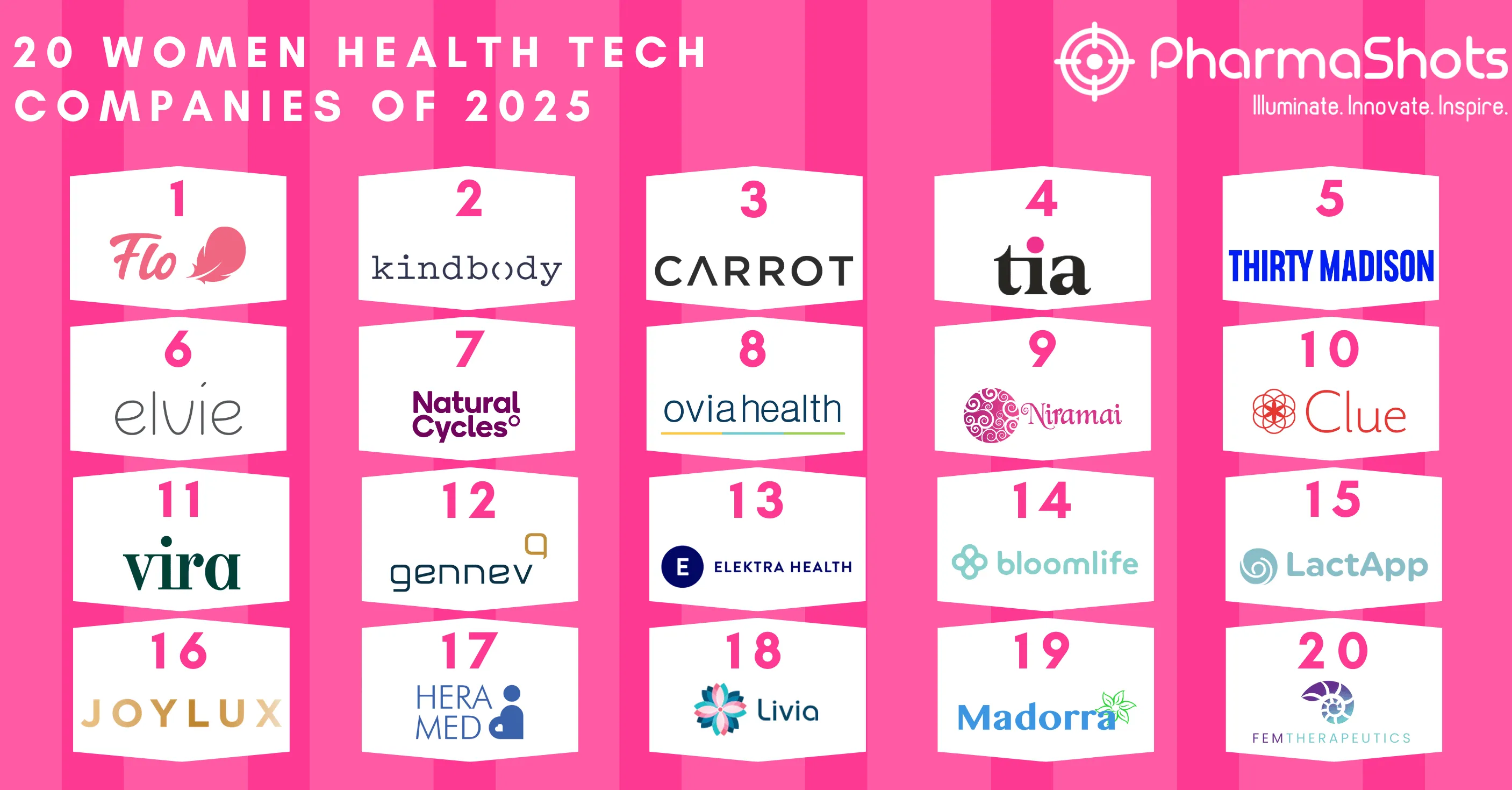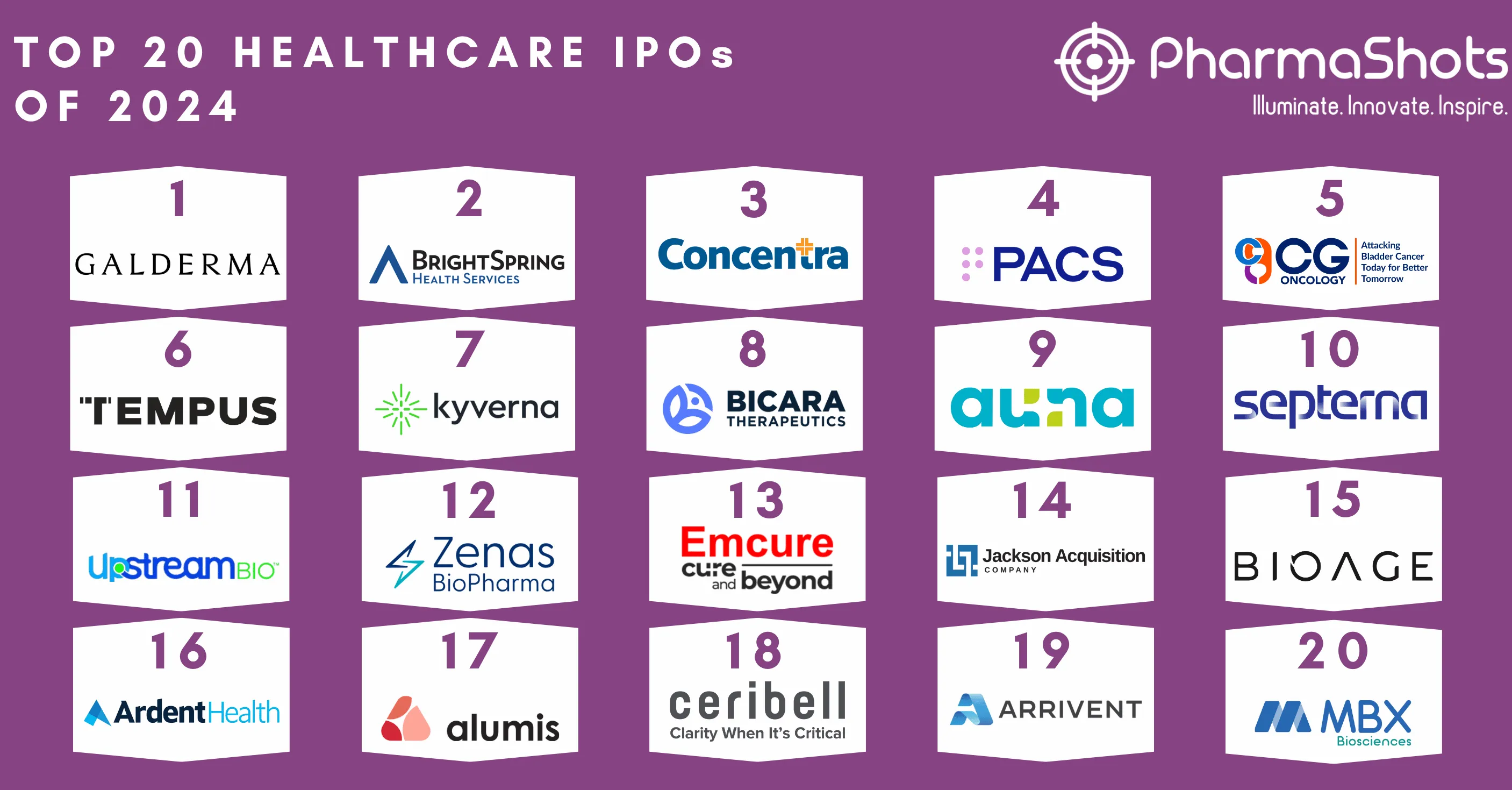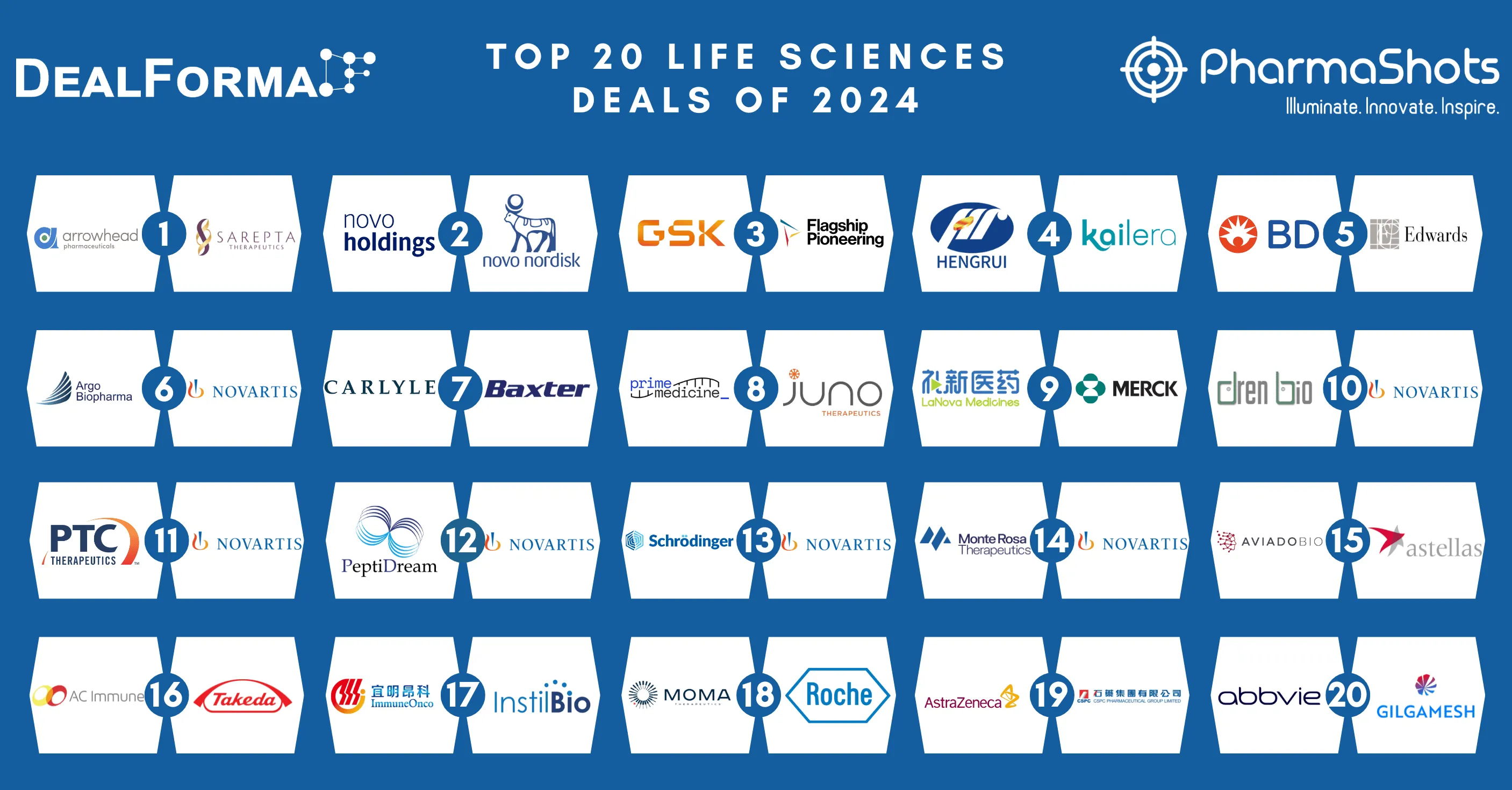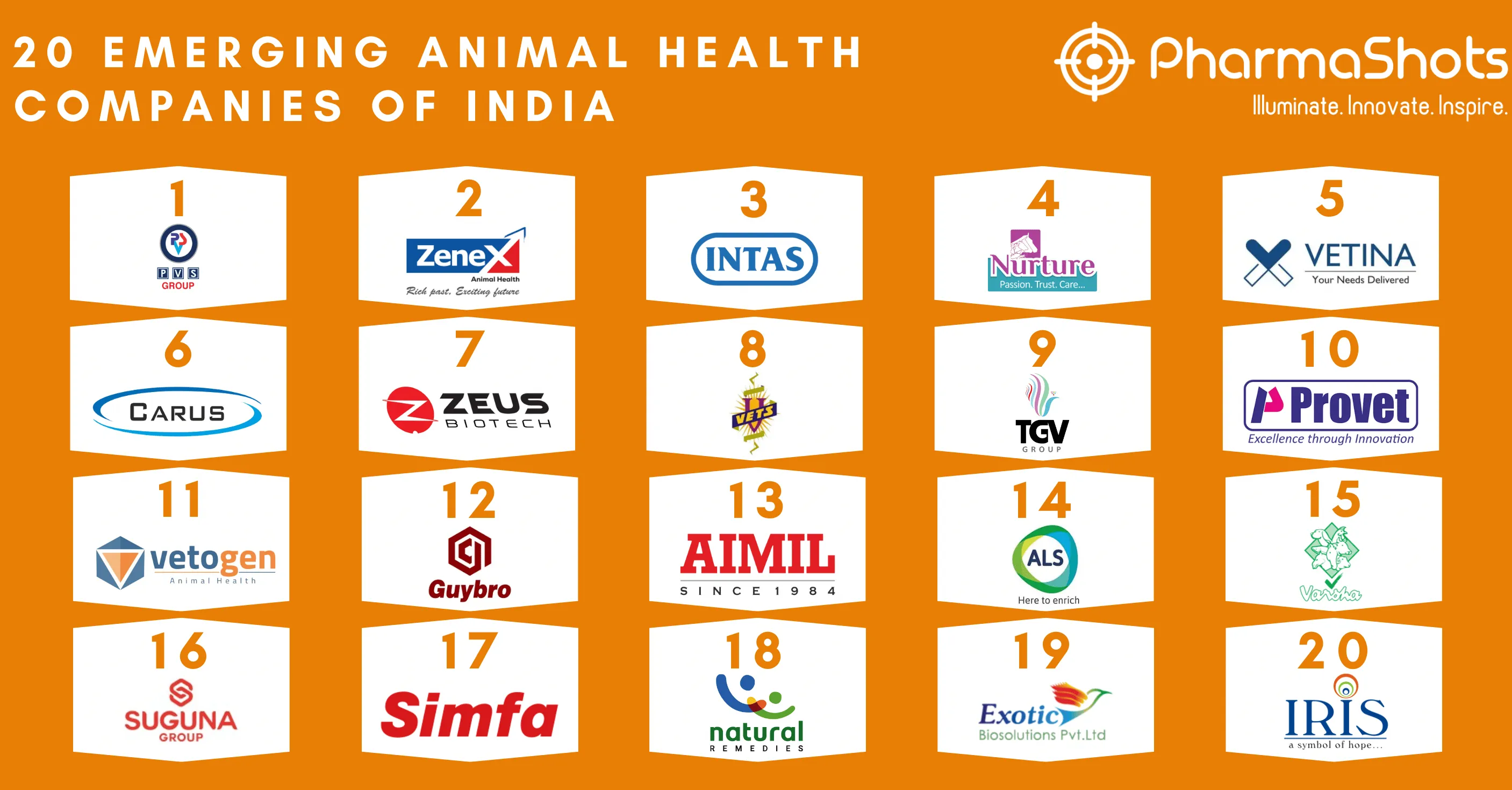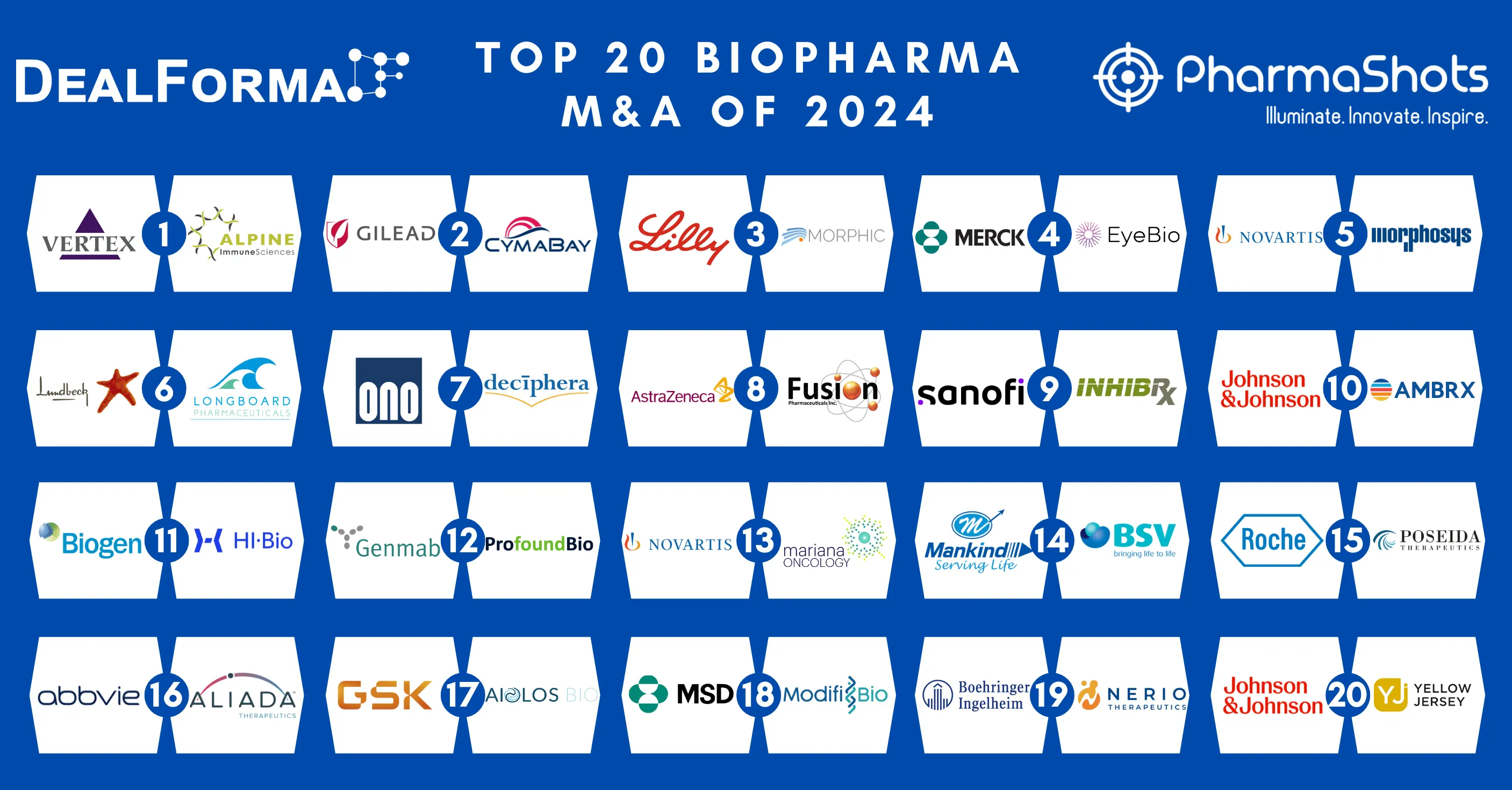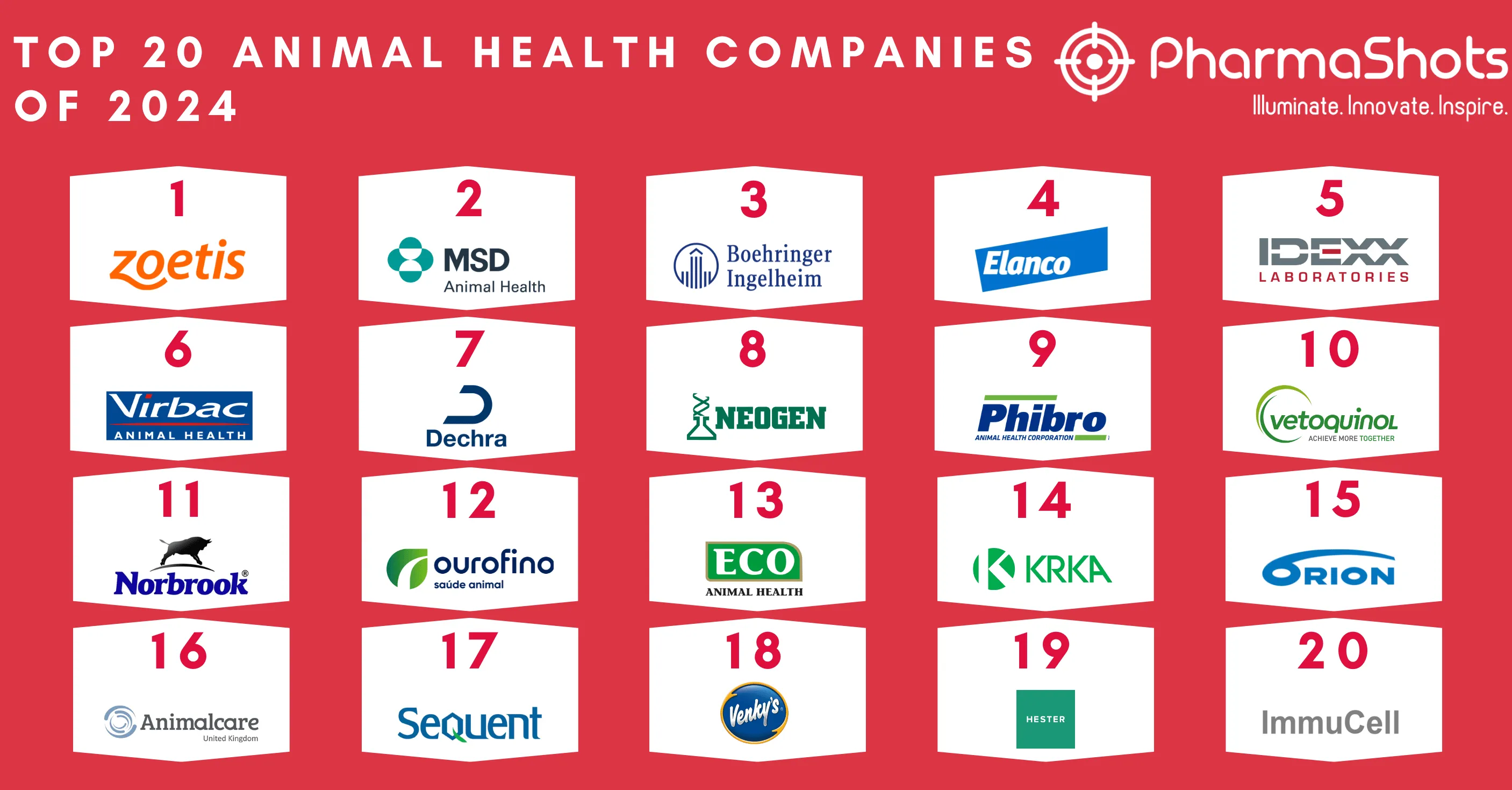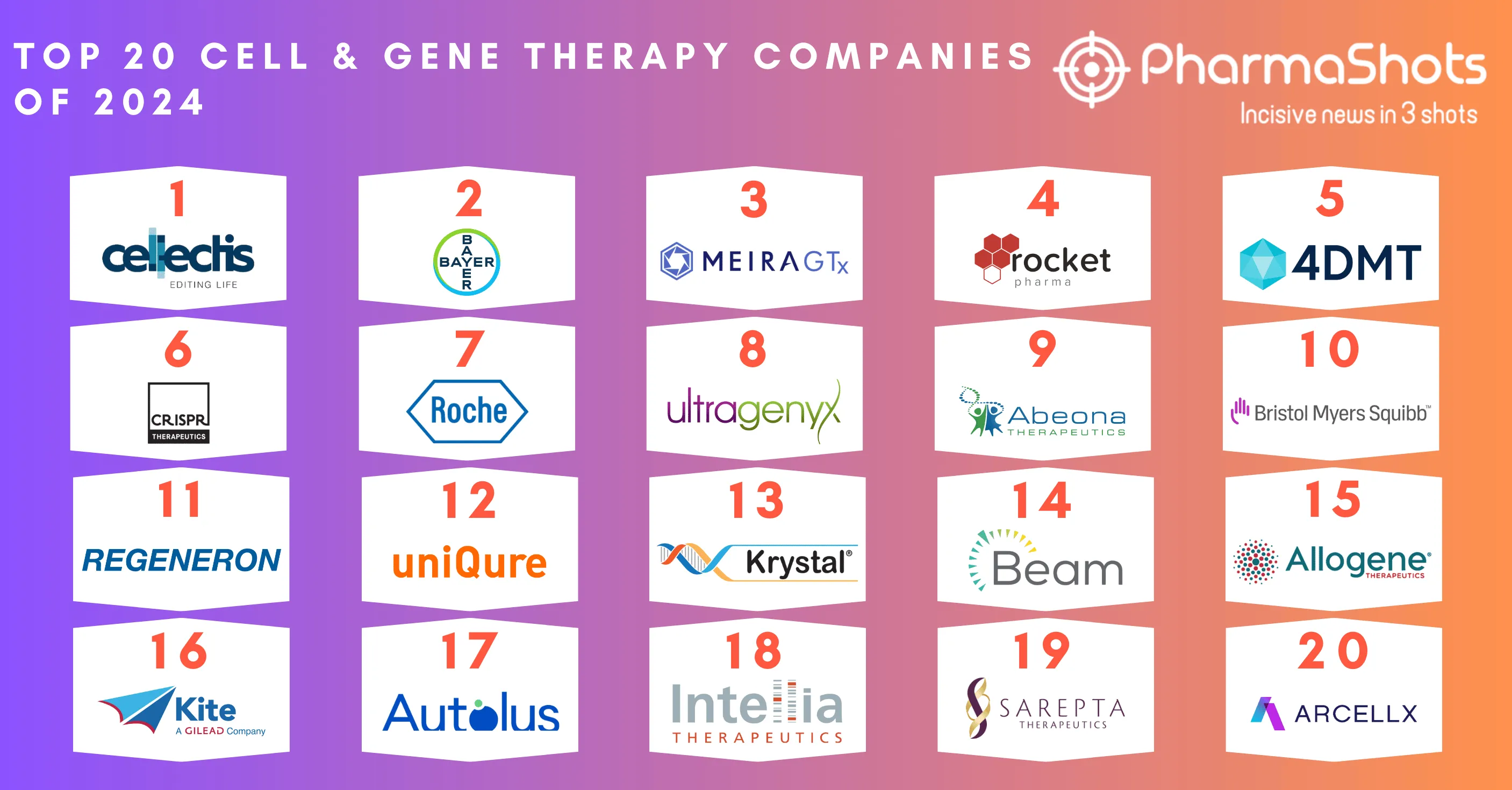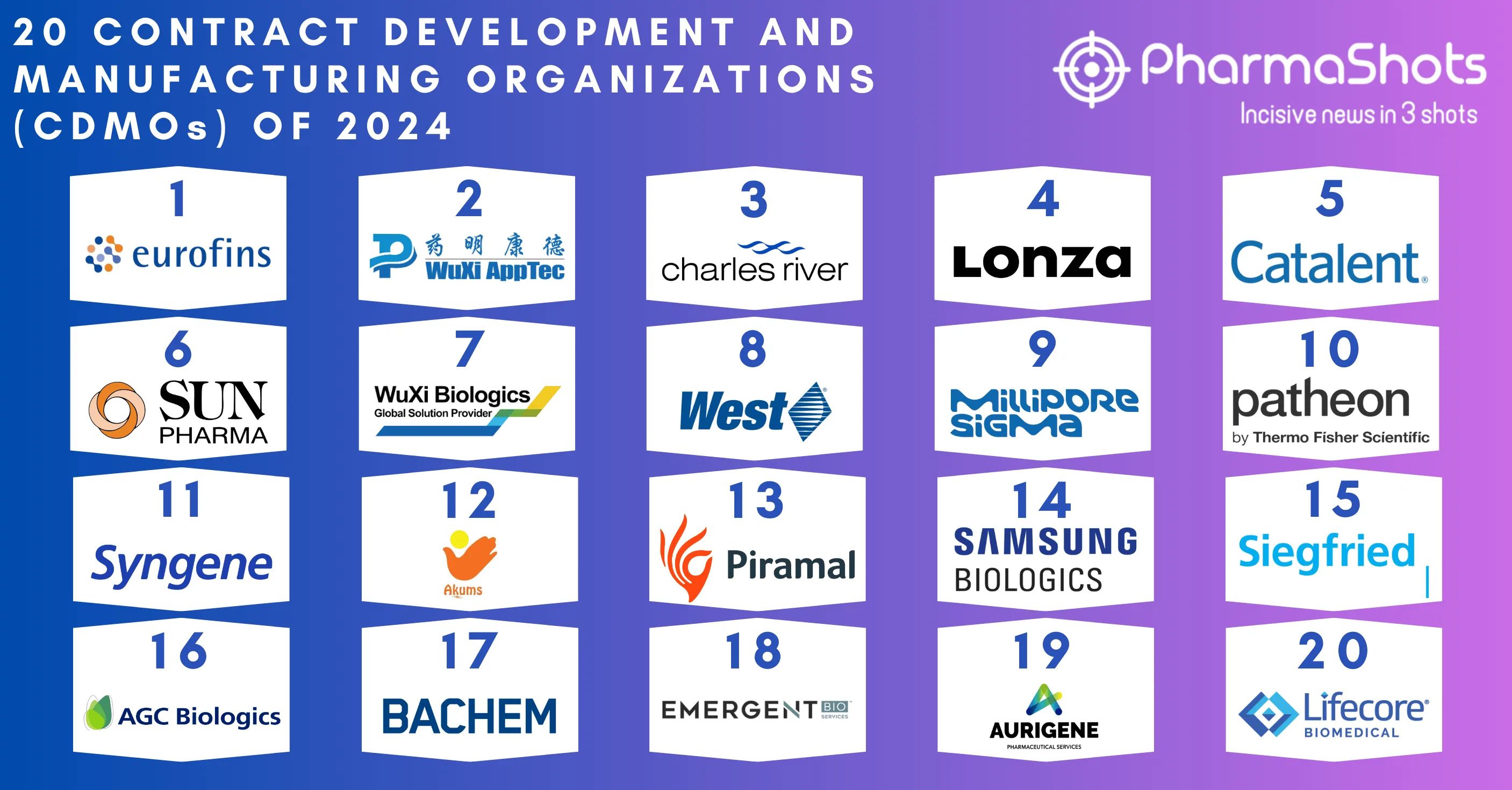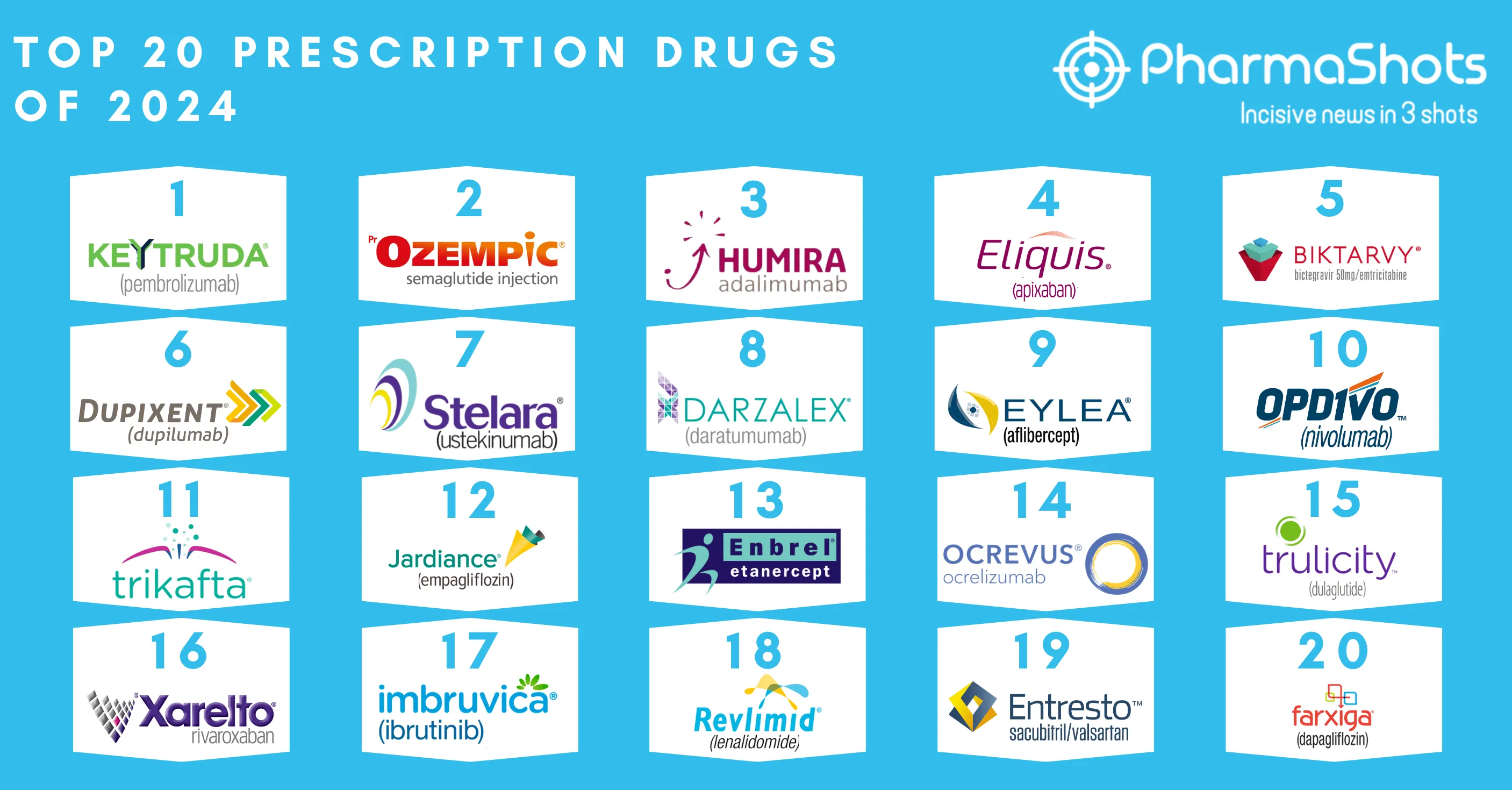
Top 20 Biopharma Deal Terminations of 2020 Based on Total Deal Value
- The biopharma industry saw numerous deal terminations in 2020. Clinical and regulatory results- change in control limitations- and strategic reprioritizations were among the most common reasons for deal termination.
- Sanofi and Hanmi's agreement in 2015 ranked first under which Hanmi regained WW rights to its protein/peptide discovery technology- lapscovery. The second position goes to the Merck KGaA termination of its development and commercialization deal with Pfizer
- This article is based on the 2020 biopharma deals data provided by Chris Dokomajilar of DealForma. PharmaShots has compiled a list of the top 20 terminations of 2020 based on total deal value

Sanofi Terminated its 2015 Agreement with Hanmi
In Nov. 2015- Hanmi granted Sanofi exclusive- worldwide rights to its protein/peptide discovery technology- lapscovery to develop and commercialize a late-stage GLP1-RA agonist- efpeglenatide weekly insulin- and a fixed-dose weekly GLP-1-RA/insulin drug combination for the treatment of diabetes. Additionally- Hanmi had an exclusive option to co-commercialize the products in Korea and China. Hanmi received $434.7M up front and was eligible for up to $3.8B in development- regulatory- and sales-based milestones- plus double-digit royalties. In May 2020- Sanofi terminated the agreement and Hanmi regained worldwide rights.

Merck KGaA Terminated its Development and Commercialization Deal with Pfizer
Merck KGaA partnered with Pfizer to jointly develop & commercialize MSB0010718C for multiple types of cancer. The companies would develop the Ab as a single agent and in combination with Pfizer's and Merck KGaA's portfolio of approved and investigational oncology therapies. Both companies would collaborate on up to 20 immuno-oncology clinical development programs expected to commence in 2015- including up to 6 trials in P-II or P-III. Pfizer and Merck KGaA also partnered separately to co-promote Pfizer's Xalkori in the US and other markets. Merck KGaA received $850M up front and was eligible to receive up to $2B in regulatory and sales milestones. Both companies would jointly fund all development and commercialization costs and split profits. On Mar. 19- 2019- Merck & Pfizer discontinued the P-III trial (JAVELIN Ovarian PARP 100) due to clinical trial results to develop avelumab in combination with CT followed by maintenance therapy of avelumab in combination with PARP inhibitor (talazoparib) for LA or metastatic ovarian cancer (Stage III or Stage IV). On Mar. 13- 2020- the companies terminated their P-III JAVELIN Head and Neck 100 trial of Bavencio (avelumab) with CRT for LA SCCHN as it failed to hit its 1Eps.

AbbVie (Allergan) Terminated its Development and Commercialization Deal with Assembly Biosciences
In Jan. 2017- Assembly Biosciences granted Allergan exclusive- worldwide rights to co-develop and commercialize ABI-M201 and ABI-M301 for the treatment of ulcerative colitis and Crohn's disease- plus an additional two drugs for the treatment of Irritable Bowel Syndrome with Diarrhoea- with Constipation (IBS-C)- or Mixed (IBS-M). Allergan and Assembly shared development costs until proof-of-concept studies. Assembly received $50M up front and was eligible for up to $2.77B in milestones- plus royalties. In May 2020- AbbVie acquired Allergan and on Jun. 18- 2020- AbbVie- terminated the agreement with Assembly Biosciences.

Eli Lilly Terminated its 2017 Agreement with CureVac
In Oct. 2017- CureVac granted Eli Lilly rights to develop and commercialize its 5 mRNA cancer vaccines using CureVac's RNActive technology for up to 5 cancer vaccines that target neoantigens across multiple tumor types. Lilly was responsible for target identification- clinical development- and commercialization. CureVac was responsible for mRNA design- formulation- and manufacturing of clinical supplies. CureVac had the option to co-promote vaccines in Germany. CureVac received $50M up front- an equity investment of $51M (45M) and CureVac would be eligible to receive more than $1.7B in development and sales milestones if all 5 vaccines are successfully developed- plus tiered royalties. In Jun. 2020- Eli Lilly terminated the agreement.

Voyager Terminated its Option and License Deal with AbbVie
In Feb. 2019- Voyager granted AbbVie options to license exclusive- worldwide rights to vectorized antibody-based gene therapies for Parkinson's and other neurodegenerative diseases. Voyager would perform preclinical development to vectorize antibodies directed against alpha-synuclein designated by AbbVie. AbbVie would select one or more vectorized antibodies to advance into IND-enabling studies and clinical development. Voyager would be responsible for research- IND-enabling- and P-I clinical activities and costs. After completing P-I- AbbVie had an option to license the vectorized alpha-synuclein antibody program for further clinical development and global commercialization for Parkinson's disease and other synucleinopathies. Voyager received $65M up front and was eligible for up to $245M in preclinical and P-I option payments- up to an additional $728M in development and regulatory milestones for each alpha-synuclein vectorized antibody compound- and up to $500M in total sales milestones- plus tiered royalties. On Aug. 3- 2020- Voyager Therapeutics terminated the agreement with AbbVie.

AstraZeneca Terminated its Development and Commercialization Deal with Allergan
In Oct. 2016- AstraZeneca's global biologics research and development arm- MedImmune- granted Allergan exclusive- worldwide rights to develop and commercialize MEDI2070. The IL-23 monoclonal antibody was being developed for the treatment of Crohn's disease and ulcerative colitis and was developed in partnership with Amgen Inc. under a 2012 deal. AstraZeneca received $250M up front and was eligible for up to $1.27B in milestones- plus royalties. AstraZeneca would share one-third of all payments and royalties with Amgen Inc. Amgen would also receive a single-digit inventory royalty on MEDI2070. On Jan. 27- 2020- AstraZeneca and Allergan mutually terminated the agreement- Allergan funded the ongoing study of brazikumab in CD and UC including CDx.

Eli Lilly Terminated its Research Partnership and Option to License Agreement with NextCure
In Nov. 2018- Lilly signed a research partnership with NextCure with an option to license immuno-oncology therapies using NextCure's FIND-IO platform. Lilly had the exclusive option to license the antibodies resulting from the study. NextCure received $25M up front and Lilly invested $15M in NextCure. If Lilly exercised its option to license the drug- NextCure would be eligible to receive up to $1.4B in milestones- plus royalties. On Jan. 10- 2020- Eli Lilly terminated the agreement with NextCure effective Mar. 3- 2020.

Bridge Biotherapeutics and Boehringer Ingelheim Mutually Terminated their Development and Commercialization Deal
In Jul. 2019- Bridge granted Boehringer exclusive- worldwide rights to develop and commercialize BBT-877 for the treatment of fibrosing interstitial lung diseases such as idiopathic pulmonary fibrosis (IPF). The Bridge received $50.48M up front and was eligible for up to $1.23B in milestones- plus royalties. On Nov. 9- 2020- Bridge Biotherapeutics and Boehringer mutually terminated the agreement.

Voyager Terminated its License Option Deal with AbbVie
In Nov. 2018- Voyager granted AbbVie an option to license the development and commercialization of its vectorized antibodies targeting tau by combining AbbVie's monoclonal antibody expertise and Voyager's gene therapy platform and expertise to generate AAV vectors for the treatment of neurodegenerative diseases- including Alzheimer's disease. Both companies planned to identify 5 antibodies based on Voyager's gene therapy platform and select 3 antibodies for development. AbbVie had an option to license up to 2 antibodies following the completion of P-I and would be fully responsible for development costs. Voyager received $69M up front- and was eligible for up to $155M in preclinical and P-I option payments- and was eligible for up to $895M in development and regulatory milestones- plus royalties. On Aug. 3- 2020- Voyager terminated the agreement with AbbVie.

Amgen Terminated its 2006 Research Partnership with Cytokinetics
In Dec. 2006- Cytokinetics signed a research partnership with Amgen to develop CK-1827452 for the treatment of heart failure. Amgen had an exclusive option to license the drug candidate worldwide excluding Japan before the completion of a P-IIa study. Cytokinetics was responsible for initial development. Upon exercising its option- Amgen was responsible for all further development costs. Also- the partners developed cardiac myosin as a backup compound. Cytokinetics received $75M up front- including $33M in its common stock at a premium of $6.9M. Upon option exercise- Cytokinetics received a $50M option exercise fee and was eligible for up to $600M in development- regulatory- and sales milestones- plus escalating royalties. Cytokinetics had the option to co-fund the P-III study in exchange for additional royalties. If Cytokinetics decided to co-fund the study- it could co-promote the drug in North America. In 2013- Amgen licensed Japan rights- and in 2016 Amgen sublicensed the rights for Europe and the Commonwealth of Independent States to Servier. On Nov. 23- 2020- Amgen terminated the agreement and Cytokinetics regained worldwide rights for omecamtiv mecarbil and backup compound AMG 594. The termination was effective May 20- 2021. The sublicense agreement between Amgen and Servier would remain effective post-termination.

Roivant Terminated its Development and Commercialization Deal with Poxel
In Feb. 2018- Poxel granted Roivant Sciences and its subsidiary Metavant rights to develop and commercialize its oral therapy- Imeglimin- for T2 Diabetes. Poxel received $35M up front and was eligible for up to $600M in milestones- plus royalties. Roivant invested $15M in Poxel's common stock by purchasing 1-431-399 ordinary shares at 8.5 per share. Roivant was responsible for worldwide development and commercialization. Poxel planned to contribute $25M to the development and had an option to co-promote the product. In Nov. 2020- Metavant terminated the agreement with Poxel for the development of Imeglimin following a strategic analysis.

Alexion Terminated its Development and Commercialization Deal with Affibody
In Mar. 2019- Affibody granted Alexion rights to develop and commercialize ABY-039 for IgG-mediated autoimmune diseases. Affibody received $25M up front and was eligible for up to $625M in development and sales-based milestones- plus tiered low double-digit royalties. Additionally- Affibody had an option to co-promote the bivalent antibody-mimetic targeting the neonatal Fc receptor (FcRn) in the US. In Feb. 2020- Alexion terminated the agreement following unfavourable early-stage data.

Boehringer Ingelheim Terminated its Development and Commercialization Deal with Zealand
In Jun. 2011- Zealand granted Boehringer Ingelheim exclusive- worldwide rights to develop and commercialize glucagon/GLP-1 dual agonists- including ZP2929- for the treatment of type-2 diabetes and obesity. Zealand received $52.4M up front- including reimbursements cost and $5.6M in research funding- and was eligible for up to $532.2M in development and commercial milestones- plus double-digit royalties. In Mar. 2020- Boehringer Ingelheim terminated the agreement and Zealand regained worldwide rights.

BMS (Celgene) Terminated its Development and Commercialization Deal with Jounce
In Jul. 2019- Jounce granted Celgene exclusive- worldwide rights to develop and commercialize JTX-8064 targeting the LILRB2 receptor on macrophages. Jounce received $50M up front and was eligible for up to $480M in milestones- plus royalties. In Jun. 2020- Bristol Myers Squibb terminated the agreement.

Cytokinetics Terminated its Development and Commercialization Deal with Astellas
In Jun. 2013- Cytokinetics granted Astellas exclusive- worldwide rights to co-develop and commercialize CK-2127107 for skeletal muscle weakness. Cytokinetics had the option to co-promote products in the US and Canada. Cytokinetics received $16M up front- $24M in R&D reimbursement- and was eligible for over $250M in development and sales milestones for collaboration products- including up to $112M for CK-2127107 and up to $200M in sales milestones- plus undisclosed royalties. On Dec. 22- 2014- Cytokinetics restated the agreement and granted Astellas exclusive- worldwide rights to co-develop & commercialize CK-2127107 and other products for SMA and other neuromuscular indications. Cytokinetics was responsible for P-II in patients with SMA and other neuromuscular diseases. Both companies would co-develop and co-commercialize CK-2127107 and other skeletal troponin activators in neuromuscular indications. Cytokinetics had the option to co-fund certain development costs- co-promote & conduct commercial activities for CK-2127107 in non-neuromuscular and neuromuscular indications in the US- Canada- and EU. On Jul. 27- 2016- Cytokinetics extended the agreement and granted Astellas additional rights to develop and commercialize tirasemtiv and CK-2127107 for ALS. Cytokinetics received a $100M option exercise fees and was eligible for additional milestones- plus royalties based on sales of tirasemtiv in Astellas' countries. Also- Astellas was eligible for royalties based on Cytokinetics' sales of tirasemtiv in its territory. On Apr. 23- 2020- the companies mutually terminated the agreement- Astellas contributed one-third of the development cost- or ~$12M- in an exchange of royalties in the US- Canada- and the EU for 10 years or reduced royalties until 2034. Also- Astellas returned all inventory and IP related to FRSA compounds and agreed not to engage in any research and development activities on FSRA compounds for 4 years.

Calithera Terminated its Development and Commercialization Deal with Incyte
In Jan. 2017- Calithera granted Incyte worldwide rights to develop and commercialize its arginase inhibitor- CB-1158- for the treatment of hematology and oncology indications. Incyte would fund 70% of the development cost while Calithera would fund 30%. Incyte and Calithera would share profits and losses- with Incyte at 60% and Calithera at 40%- based on U.S. sales. Incyte and Calithera planned to co-detail the drug in the U.S. and Calithera was eligible for up to $483M- including upfront and milestones- plus royalties ex-U.S. In Sep. 2020- Calithera terminated the agreement and regained worldwide rights.

Idorsia Terminated its Option and License Deal with Santhera for Vamorolon
In Nov. 2018- Idorsia granted Santhera an option to sublicense the development and commercialization of vamorolone for the treatment of DMD worldwide- excluding Japan and South Korea. Idorsia received 1M new registered shares of Santhera and an upfront cash payment of $20M. Idorsia became the largest shareholder in Santhera with a 13.3% equity position. The option was exercisable upon receipt of data from the P-IIb VISION-DMD study (VBP15-004). If exercised- Idorsia would receive a one-time payment of $30M and was eligible for regulatory & commercial milestones of up to $80M for the DMD indication and four one-time sales milestone payments of up to $130M in total. Idorsia was also eligible for regulatory milestone payments of up to $205M for three additional indications. On Sep. 2- 2020- Santhera exercised its option to license vamorolone for all indications including DMD- and revised the terms of the agreement. Vamorolone was originally developed by ReveraGen- and Actelion had the option rights. In Jun. 2017- Actelion spun off Idorsia as a separate entity along with vamorolone rights before its merger with Johnson & Johnson. According to the revised terms of the agreement- Idorsia received 366-667 shares in Santhera's common stock and CHF10M in the form of convertible notes- up to 65% was converted in the form of Santhera common stock and transfer the control rights to its original developer ReveraGen BioPharma. Santhera had replaced Idorsia as party to the ReveraGen agreement.

AMAG Terminated its Development and Commercialization Deal with Palatin Technologies
In Jan. 2017- Palatin Technologies granted AMAG Pharmaceuticals rights to develop and commercialize Rekynda (bremelanotide) for the treatment of female sexual disorders in North America. Palatin received $60M up front- up to $380M in milestones- and $25M in reimbursement payments- plus royalties. In Jul. 2020- AMAG terminated the agreement and Palatin Technologies regained the rights plus $16.3M in termination fees.

Gilead Terminated its Development and Commercialization Deal with Precision BioSciences
In Sep. 2018- Precision granted Gilead rights to develop and commercialize therapies for Hepatitis B Virus targeting HBV cccDNA and integrated HBV DNA present in human hepatocytes using Precision's ARCUS platform. Precision would focus on the development- formulation- and preclinical studies. Gilead was responsible for clinical studies and commercialization. Precision received research funding and was eligible for up to $445M in milestone payments and royalties. In Sep. 2020- Gilead terminated its agreement with Precision BioSciences.

ReveraGen Terminated its Option and License Deal with Actelion (Idorsia after the spin-off from Actelion)
In Nov. 2016- Actelion signed a research partnership with ReveraGen BioPharma with an option to license vamorolone for the treatment of DMD and other indications. Actelion would co-develop the compound for the next 28 months and would contribute $1M annually. ReveraGen received $10M up front- up to $165M in dev. and reg. milestones for DMD- and up to $190M for an additional three indications- plus tiered double-digit royalties. On Jun. 16- 2017- Actelion was acquired by Johnson & Johnson. Actelion spun off Idorsia as a new company. In 2018- Idorsia maintained the option rights for vamorolone and restructured the agreement. It agreed to contribute the research for an additional year (until mid-2020). ReveraGen initially received $15M to maintain the agreement- a $20M option fee- and would be eligible for up to $75M in milestones for the DMD indication- and three additional sales milestones of up to $120M. Royalties and milestone payments for other indications remain unchanged. In Nov. 2018- Idorsia granted Santhera an option to sublicense the development and commercialization of vamorolone for DMD worldwide- excluding Japan and South Korea. On Sep. 2- 2020- Santhera exercised its option to license vamorolone for all indications including DMD with the control rights transferred to ReveraGen BioPharma.
Related Post: Top Biopharma Deal Terminations of 2018-2019 by Total Value Received
Tags

This content piece was prepared by our former Senior Editor. She had expertise in life science research and was an avid reader. For any query reach out to us at connect@pharmashots.com




